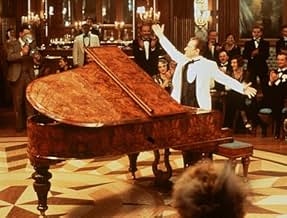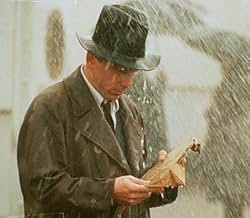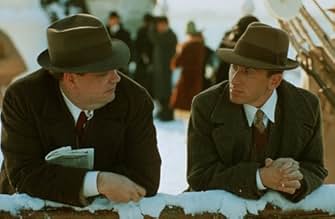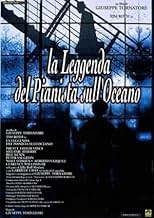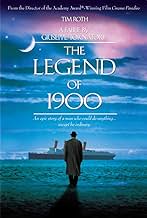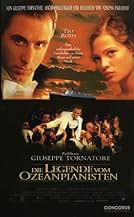La légende du pianiste sur l'océan
- 1998
- Tous publics
- 2h 49m
A baby boy discovered on an ocean liner in 1900 grows into a musical prodigy, never setting foot on land.A baby boy discovered on an ocean liner in 1900 grows into a musical prodigy, never setting foot on land.A baby boy discovered on an ocean liner in 1900 grows into a musical prodigy, never setting foot on land.
- Director
- Writers
- Stars
- Awards
- 22 wins & 10 nominations total
- Machinista messicano
- (as Alberto Vázquez)
- Director
- Writers
- All cast & crew
- Production, box office & more at IMDbPro
Featured reviews
What they all have in common, besides beautiful cinematography, is that they try, quietly and modestly but nevertheless ambitiously, to investigate some aspects of the very essence of the human soul. The emotion used by many such movies, especially the ones directed by Tornatore, is nostalgia: by understanding the pain of irrecoverable loss we are supposed to understand what we truly needed. These movies express perfectly HL Mencken's definition of the artist as "one who observes the eternal tragedy of man with full sympathy and understanding, and yet with a touch of god-like remoteness."
However, for reasons I fail to understand, the unavoidable sentimentality of these movies bothers many critics and casual viewers to no end. It's true that sentimental art exposes itself the most to irony and cynicism, but it is nevertheless disappointing to see many critics taking advantage of its vulnerability and indulging in hitting hard and hitting low against such movies. No wonder that art in general, not only movies, is nowadays almost devoid of sentimentality. Artists choose to clad themselves in critic-proof armors of irony and sophistication. Honesty has long become a dangerous no-win proposition.
So I say 'Bravo!' to Tornatore for having the courage to give us some bullshit-free insight into ourselves by showing us what moves us and why. I also say 'Boo!' to the critics who don't get it, and who mistake their expectations and biases for some kind of objective artistic standard.
The talented star of "The Legend of 1900", Tim Roth, presented this film along with Clarence Williams III. His encouragement to the audience was that if anyone was the sort who liked to pick apart at films and critique their lack of realism, they should just leave now. He touted this wonderful vision from the director of Cinema Paradiso, Giuseppe Tornatore, and likened the film to a "dream". He also said that if anyone had seen his own film, "The War Zone", that "1900" was the antidote for it. I was slated to see "The War Zone" the next day, but that was fine by me. I managed by a sheer stroke of luck to get into this Canadian premiere and found it to be absolutely extraordinary and the best film I'd seen so far of the Toronto International Film Festival.
It seems as though mere moments after the initial credits, that the wonderful storytelling and incredible music combined with stunning visuals almost had me moved to tears. While I'll admit that I'd be seeing films all day, no film in my recollection had such an impact so quickly.
The story is one of an abandoned baby who is found on a ocean liner by one of the ship's crew. He is unofficially adopted and named "1900" for the year in which he was born. At a very early age the boy demonstrates an extraordinary gift for piano playing which is only strengthened in his passing years. The boy grows up with no official identity, into a man having never taken a step off of the ship onto dry land in his whole life. The young man, played by Tim Roth is encouraged by his dear friend to leave the boat and pursue a life of fame and fortune as the great pianist he has become. 1900 declines, explaining simply that everything he needs is on the boat.
Well, that should be enough to intrigue you; there's much more of course, but I've no desire to spoil it for anyone. I must encourage everyone to see this film, I can hardly imagine anyone being disappointed. It's for music lovers, dreamers, romantics and film buffs everywhere and my greatest hope is that it will be seen by many, many people, especially those I know and love. And after seeing the film, and hearing Tim Roth's words echoing in my mind, he was absolutely right. It is like a dream, a wonderful dream that I wished would never end. And for a future prediction, I see this film as a Best Foreign Film Oscar nomination for 1999.
The film is narrated by Max (Pruitt Taylor Vince), an American saxophone player whom we meet at the beginning as he tries to pawn his trumpet. On leaving the shop, however, he hears the only recording 1900 ever made, a master that he had broken into pieces but that was later restored. When he finds out that the master came from a ship about to be demolished, he rushes to save 1900 whom he is sure is still aboard. In the process, he tells his story to convince others that 1900 exists. Through flashbacks we learn about 1900 and how he navigated his life from stem to stern. The question throughout the film is whether or not 1900 will abandon the ship and set foot on land? There is a hint that he might do so after he meets a beautiful young woman (Melanie Theirry). She inspires him to compose a beautifully expressive love song while gazing at her through a window, but the only thing that remains is the last copy of the record and an enduring memory.
The Legend of 1900 creates its own world and I confess it is one that I got lost in. This is a lovely film that has a heart. It is sentimental without question but is redeemed by the glorious music by Ennio Morricone, beautiful cinematography by Lajos Koltai, and a terrific jazz piano duel between the adult 1900 (Tim Roth) and Jelly Roll Morton played by Clarence Williams III. 1900's world has clearly defined limits and he is fearful of venturing beyond. Land represents for him a place without boundaries, where people can get lost, a place without beginning or end. To me, The Legend of 1900 may be a metaphor for people who find a comfortable niche for themselves in life and are afraid to take risks to see what the possibilities are. In many cases, as with 1900, the world will never know the contribution they might have made.
Did you know
- GoofsThe recording equipment used for making the record was clearly acoustic in nature, showing large horns. This type of recording was largely replaced in 1925 by electrical recording, using microphones. Yet the recording was made somewhere between 1927 and 1933, according to Tooney's story. Furthermore, the recording engineer played back the matrix immediately; this would have ruined the matrix, which was cut in wax. In those days, immediate playback was only possible using a second set of equipment especially for that purpose.
- Quotes
1900: [explaining why he didn't leave the ship and never will be] All that city... You just couldn't see an end to it. The end! Please, could you show me where it ends? It was all very fine on that gangway and I was grand, too, in my overcoat. I cut quite a figure and I had no doubts about getting off. Guaranteed. That wasn't a problem. It wasn't what I saw that stopped me, Max. It was what I didn't see. Can you understand that? What I didn't see. In all that sprawling city, there was everything except an end. There was everything. But there wasn't an end. What I couldn't see was where all that came to an end. The end of the world. Take a piano. The keys begin, the keys end. You know there are 88 of them and no-one can tell you differently. They are not infinite, you are infinite. And on those 88 keys the music that you can make is infinite. I like that. That I can live by. But you get me up on that gangway and roll out a keyboard with millions of keys, and that's the truth, there's no end to them, that keyboard is infinite. But if that keyboard is infinite there's no music you can play. You're sitting on the wrong bench. That's God's piano. Christ, did you see the streets? There were thousands of them! How do you choose just one? One woman, one house, one piece of land to call your own, one landscape to look at, one way to die. All that world weighing down on you without you knowing where it ends. Aren't you scared of just breaking apart just thinking about it, the enormity of living in it? I was born on this ship. The world passed me by, but two thousand people at a time. And there were wishes here, but never more than could fit on a ship, between prow and stern. You played out your happiness on a piano that was not infinite. I learned to live that way. Land is a ship too big for me. It's a woman too beautiful. It's a voyage too long. Perfume too strong. It's music I don't know how to make. I can't get off this ship. At best, I can step off my life. After all, it's as though I never existed. You're the exception, Max. You're the only one who knows that I'm here. You're a minority. You'd better get used to it. Forgive me, my friend. But I'm not getting off.
- Alternate versionsOriginal version released in Italy is 2 hours and 45 minutes long. A 123-minutes version premiered at the Locarno film Festival in July 1999. This shorter version is the same released in the USA by Fine Line under the title "The Legend of 1900".
- ConnectionsEdited into Spisok korabley (2008)
- SoundtracksBig Fat Ham
Written by Ferdinand 'Jelly Roll' Morton (uncredited)
Performed by Ferdinand 'Jelly Roll' Morton (as 'Jelly Roll' Morton)
Edizioni Chappell s.r.l
Details
- Release date
- Country of origin
- Languages
- Also known as
- La leggenda del pianista sull'oceano
- Filming locations
- Production companies
- See more company credits at IMDbPro
Box office
- Budget
- $9,000,000 (estimated)
- Gross US & Canada
- $167,435
- Opening weekend US & Canada
- $39,200
- Oct 31, 1999
- Gross worldwide
- $21,061,339
- Runtime2 hours 49 minutes
- Color
- Sound mix
- Aspect ratio
- 2.35 : 1
Contribute to this page



